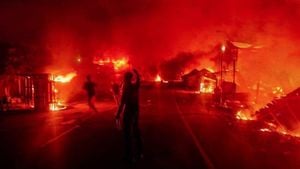Every November, stargazers around the world eagerly anticipate the Leonid meteor shower, one of the most famous celestial events of the year. This weekend, the Leonids are expected to reach their peak, offering the chance to witness nature's spectacular light show, with meteors streaking across the night sky.
The Leonid meteor shower derives its name from the constellation Leo, as the meteors appear to radiate from this region of the sky. The event is fueled by the debris shed by the comet 55P/Tempel-Tuttle, which visits the inner solar system approximately every 33 years. When Earth passes through this comet's trail of icy and dusty fragments, they enter our atmosphere at high speed and disintegrate, creating stunning meteors—commonly referred to as shooting stars.
This year, the shower is predicted to peak late Saturday night, November 16, and early Sunday morning. While typical years see about 15 meteors per hour, special circumstances can boost visibility significantly, such as when the Earth intersects particularly dense debris trails left by the comet. Unfortunately for meteor enthusiasts, 2024 does not appear to be one of those exceptional years.
The brilliance of the Leonids may be somewhat muted this year due to the moon's brightness. Known as the Beaver Moon, November's full moon will be nearly 98% illuminated this weekend, which could potentially hinder visibility by drowning out the fainter meteors. That said, conditions for viewing may still improve just before dawn when the moon begins to set.
To maximize chances of seeing meteors, experts recommend finding dark locations away from city lights, where the night sky can be seen unobstructed. Lying flat on your back with feet facing east for about 30 minutes will allow your eyes to adjust to the darkness—enhancing your ability to spot the shooting stars as they dart by. Many enthusiasts choose to bundle up with warm blankets and jackets, as November nights can be quite chilly.
Traditionally, wishing on stars has captured human imagination for centuries. Historically linked to superstitions and ancient beliefs, such acts reflect humanity's desire to connect with the cosmos. The concept dates back to the second century when the Greek astronomer Ptolemy wrote of shooting stars as glimpses of divine attention upon humanity—making it the ideal moment to cast wishes skyward.
Despite the challenges posed by the bright full moon, those willing to brave the skies this weekend are likely to receive fulfilling doses of wonder as they witness the celestial display. Even if the Leonids do not perform to their fullest this year, the simple act of gazing upward at the beauty of the universe can be rewarding.
For those who miss the Leonids this weekend, the meteor shower remains active until December 2. Keep your calendars marked; soon after the Leonids, the next major meteor shower, the Geminids, will begin to light up the sky from December 2 through December 21, with its peak around December 13 expected to showcase one of the strongest displays of the year.
The Leonids remind us of the the awe-inspiring wonders of our universe and offer both seasoned astronomers and casual viewers the chance to engage with the poetry of the night sky. So grab your blankets, find your favorite stargazing spot, and perhaps make a wish or two as the meteors dance across the depths of space. Who knows, this weekend might just invite the cosmos to join you - after all, isn't it the dreams we share under the night sky, illuminated by fleeting wishes, which bind us together as humanity?



